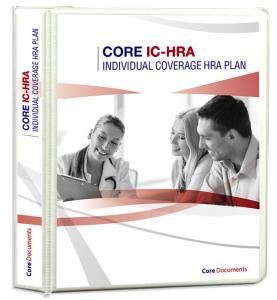CHOICE HRA Provisions Removed from One Big Beautiful Bill Act in Final Senate Revisions
The removal of the CHOICE HRA provisions from the OBBBA means the ICHRA framework remains unchanged under the existing 2019 regulations.
Background on Proposed CHOICE HRA Provisions
The One Big Beautiful Bill Act, passed by the U.S. House of Representatives on May 21, 2025, initially proposed significant updates to the ICHRA framework, rebranding it as the CHOICE HRA effective January 1, 2026. The following sections detailed these changes:
- Section 110201: Treatment of Health Reimbursement Arrangements Integrated with Individual Market Coverage
This section aimed to codify the 2019 ICHRA regulations into federal law, transitioning the regulatory framework to a statutory one. It would have formalized the CHOICE HRA as a compliant health reimbursement arrangement, ensuring integration with individual market coverage while meeting requirements under sections 9802, 2705, 2711, 2713, and 2715 of the Public Health Service Act.
- Section 110202: Participants in CHOICE Arrangement Eligible for Purchase of Exchange Insurance Under Cafeteria Plan
This provision would have amended Section 125(f)(3) of the Internal Revenue Code to allow employees enrolled in a CHOICE HRA to use salary reductions through a cafeteria plan to cover health plan premiums purchased via a Health Insurance Exchange. This change would have addressed existing restrictions, enabling employees to save on premium costs not covered by the CHOICE HRA allowance, effective for taxable years beginning after December 31, 2025.
- Section 110203: Employer Credit for CHOICE Arrangement
This section proposed a two-year tax credit for small businesses (fewer than 50 employees) adopting CHOICE HRA arrangements for the first time. The credit would have provided $100 per employee per month in the first year and $50 per employee per month in the second year, adjusted for inflation. This incentive aimed to encourage small employers, particularly those previously unable to offer health benefits, to adopt CHOICE HRAs.
These provisions were designed to strengthen the legal foundation of ICHRAs, enhance their flexibility by integrating with cafeteria plans, and promote adoption among small businesses, with 83% of new ICHRA adopters historically not offering health benefits.
Senate Revisions and Removal of CHOICE HRA Provisions
During the Senate’s review process, finalized by July 2, 2025, the CHOICE HRA provisions in Sections 110201, 110202, and 110203 were removed from the One Big Beautiful Bill Act. The Senate’s legislative text excluded these sections, and the final bill, signed into law on July 4, 2025, retained no references to the CHOICE HRA. This decision was influenced by Senate deliberations, including concerns raised by the Senate Parliamentarian about provisions requiring a 60-vote threshold under the Byrd Rule, though specific reasons for removing the CHOICE HRA sections were not detailed in public records.
Impact on ICHRA Going Forward
The removal of the CHOICE HRA provisions means the ICHRA framework remains unchanged under the existing 2019 regulations. Key implications include:
- No Statutory Codification: ICHRAs will continue to operate under the regulatory framework established in 2019, without the enhanced legal stability that federal law would have provided.
- No Cafeteria Plan Integration: Employees cannot use salary reductions through cafeteria plans to cover Exchange-purchased health plan premiums, maintaining the current restriction that limits reimbursement flexibility.
- No Tax Credits for Small Businesses: The proposed tax credits to incentivize small business adoption of ICHRAs will not take effect, potentially slowing the growth of ICHRA adoption among small employers.
- Continued ICHRA Functionality: ICHRAs remain a viable option for employers to reimburse employees for individual health insurance premiums, subject to existing compliance requirements, offering flexibility for businesses and employees.
Core Documents remains committed to monitoring legislative developments and providing expert guidance on IRS Section 125 plans, including ICHRAs. Employers and employees seeking to navigate health reimbursement arrangements are encouraged to consult with our certified professionals for tailored solutions.
Gene Ennis
Core Documents, Inc.
+1 888-755-3373
email us here
Legal Disclaimer:
EIN Presswire provides this news content "as is" without warranty of any kind. We do not accept any responsibility or liability for the accuracy, content, images, videos, licenses, completeness, legality, or reliability of the information contained in this article. If you have any complaints or copyright issues related to this article, kindly contact the author above.
Rhombus University Celebrates 2025 Graduates with Online Commencement Ceremony
'Trust Nothing, Verify Everything': Rise of AI-Powered Scams Signals New Digital Threat Era
The Seminara Group at Morgan Stanley & Twin Bridge Sports Host First-of-Its-Kind NIL Powered Financial Literacy Webinar
Więcej ważnych informacji
 Jedynka Newserii
Jedynka Newserii

 Jedynka Newserii
Jedynka Newserii

Handel

1 października ruszy w Polsce system kaucyjny. Część sieci handlowych może nie zdążyć z przygotowaniami przed tym terminem
Producenci, sklepy i operatorzy systemu kaucyjnego mają niespełna dwa miesiące na finalizację przygotowań do jego startu. Wówczas na rynku pojawią się napoje w specjalnie oznakowanych opakowaniach, a jednostki handlu powinny być gotowe na ich odbieranie. Część z nich jest już do tego przygotowana, część ostrzega przed ewentualnymi opóźnieniami. Jednym z ważniejszych aspektów przygotowań na te dwa miesiące jest uregulowanie współpracy między operatorami, których będzie siedmiu, co oznacza de facto siedem różnych systemów kaucyjnych.
Ochrona środowiska
KE proponuje nowy cel klimatyczny. Według europosłów wydaje się niemożliwy do realizacji

Komisja Europejska zaproponowała zmianę unijnego prawa o klimacie, wskazując nowy cel klimatyczny na 2040 roku, czyli redukcję emisji gazów cieplarnianych o 90 proc. w porównaniu do 1990 rok. Jesienią odniosą się do tego kraje członkowskie i Parlament Europejski, ale już dziś słychać wiele negatywnych głosów. Zdaniem polskich europarlamentarzystów już dotychczas ustanowione cele nie zostaną osiągnięte, a europejska gospodarka i jej konkurencyjność ucierpi na dążeniu do ich realizacji względem m.in. Stanów Zjednoczonych czy Chin.
Handel
Amerykańskie indeksy mają za sobą kolejny wzrostowy miesiąc. Druga połowa roku na rynkach akcji może być nerwowa

Lipiec zazwyczaj jest pozytywnym miesiącem na rynkach akcji i tegoroczny nie był wyjątkiem. Amerykańskie indeksy zakończyły go na plusie, podobnie jak większość europejskich. Rynki Starego Kontynentu nie przyciągają jednak już kapitału z taką intensywnością jak w pierwszej części roku. Z drugiej strony wyceny za oceanem po kolejnych rekordach są już bardzo wysokie, a wpływ nowego porządku celnego narzuconego przez Donalda Trumpa – na razie trudny do przewidzenia. W najbliższym czasie na rynkach można się spodziewać jeszcze większej zmienności i nerwowości, ale dopóki spółki pokazują dobre wyniki, przesłanek do zmiany trendu na spadkowy nie ma.
Partner serwisu
Szkolenia

Akademia Newserii
Akademia Newserii to projekt, w ramach którego najlepsi polscy dziennikarze biznesowi, giełdowi oraz lifestylowi, a także szkoleniowcy z wieloletnim doświadczeniem dzielą się swoją wiedzą nt. pracy z mediami.




![Nestlé w Polsce podsumowuje wpływ na krajową gospodarkę. Firma wygenerowała 0,6 proc. polskiego PKB [DEPESZA]](https://www.newseria.pl/files/1097841585/fabryka-nesquik_1,w_85,r_png,_small.png)




.gif)

 |
| |
| |
|